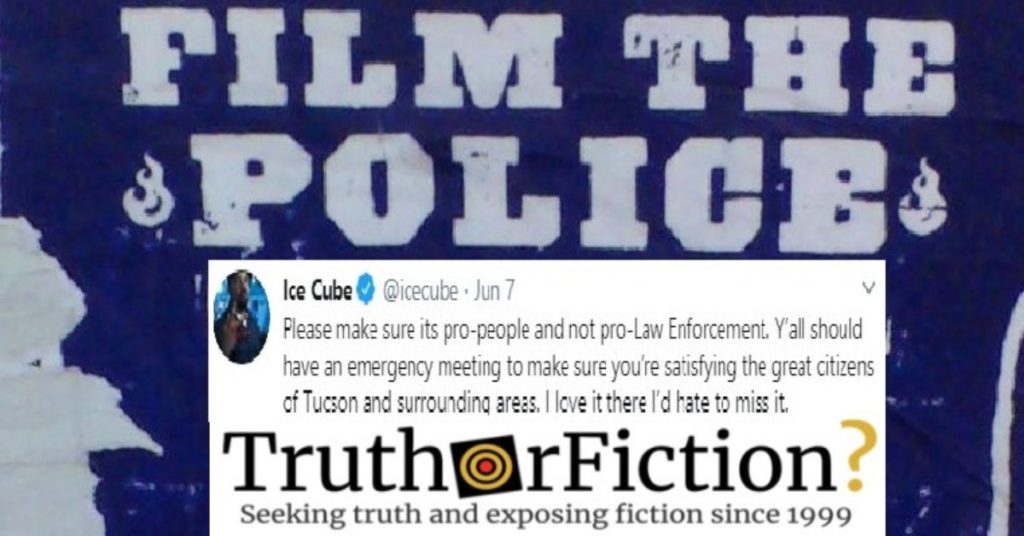A newly-passed ordinance in Tucson, Arizona came under more intense scrutiny online in early June 2020 amid protests against police brutality and law enforcement’s lack of accountability throughout the United States.
As KOLD-TV reported, Ordinance 11746 got on social media users’ radar in June 2020 thanks in part to one Twitter user who wrote:
the Tucson city council passed an ordinance making it illegal for citizens to film the Tucson police. I’m horrified. This needs national attention.
The tweet was shared more than 74,000 times on the platform and also highlighted on Reddit. The ordinance, which was passed unanimously by the local city council on April 21 2020, states:
If a Police Officer or Community Service Officer has established a restricted area, it shall be unlawful for any person to enter the restricted area without a Police Officer’s or Community Service Officer’s express permission to enter; or to refuse to comply with a Police Officer’s or Community Service Officer’s request or direction to leave the restricted area.
So while it does not prevent residents from filming police activity in total, the ordinance does establish a limit on where they can do so. For that reason, we’re ruling the original claim as Mixed. No arrests have been carried out for violating the ordinance, a misdemeanor which is punishable with a maximum fine of $750.
However, there is much more to the story. The issue gained even more visibility on June 7 2020, after rapper and actor Ice Cube shared a tweet from Tucson mayor Regina Romero saying that both she and the council “agreed to come back to review it to ensure proper implementation.”
“Please make sure its pro-people and not pro-Law Enforcement,” Cube wrote. “Y’all should have an emergency meeting to make sure you’re satisfying the great citizens of Tucson and surrounding areas. I love it there I’d hate to miss it.”
Please make sure its pro-people and not pro-Law Enforcement. Y’all should have an emergency meeting to make sure you’re satisfying the great citizens of Tucson and surrounding areas. I love it there I’d hate to miss it. https://t.co/GLcnXnHZn9
— Ice Cube (@icecube) June 7, 2020
According to the Arizona Daily Star newspaper, Romero subsequently asked the council to revisit Ordinance 11746 on June 9 2020.
“After hearing feedback from the community, it is important that we discuss and review what actions this ordinance prohibits and, just as important, what it does not prohibit,” she said.
According to the Daily Star, the ordinance was first passed without input from both the community and advocacy groups like the American Civil Liberties Union of Arizona. The group provided us with a copy of a letter it sent to the city council detailing the length of its interaction it had with City Attorney Mike Rankin prior to the ordinance being enacted:
The ACLU of Arizona learned of the Ordinance on April 20, 2020 when City Attorney Rankin called ACLU of Arizona Staff Attorney Yvette Borja. Mr. Rankin advised that he was seeking the ACLU of Arizona’s input on the ordinance and Ms. Borja asked Mr. Rankin for a copy of the ordinance. Their conversation was very brief, just a few minutes. Following that call, Mr. Rankin emailed a link to the ordinance. However, due to a problem with the links that were emailed to Ms. Borja, we did not receive a copy of the ordinance until April 22, 2020, the day after it was passed. Upon receiving the ordinance, Ms. Borja asked Mr. Rankin via email about the timeline to submit our feedback on the ordinance. He replied that the timeline is “of your choosing” and that the Mayor and City Council had approved the ordinance the night before but “”expressed a desire for continuing review.”
Like many in the community, the ACLU of Arizona was not given sufficient opportunity to provide any feedback on this ordinance. To learn that Mr. Rankin told the Mayor and City Council on April 21, 2020 that he had a conversation about the ordinance with the ACLU of Arizona in response to Mayor Romero’s question whether he gave a “head’s up to the ACLU of Arizona” is misleading at best. The 2-minute phone conversation with Ms. Borja just one day prior to the passage of the ordinance is hardly giving us a “head’s up,” and only provided false assurances to the Mayor and Council that we were somehow properly informed about this Ordinance prior to its passage.
According to the ACLU, Police Chief Chris Magnus and his department’s legal advisor Rebecca Cassen later told a local civil rights attorney, Paul Gattone, that Rankin “provided the local ACLU director with copies of the ordinances and discussed them with her prior to their adoption.”
“While the Ordinance was provided to our office on April 22 2020, a day after its passage, no one at the ACLU of Arizona communicated with City Attorney Rankin about the substance of this ordinance,” the group said. “As was explained above, the only conversation our office had with the City Attorney about the Ordinance was a short exchange with Staff Attorney Yvette Borja one-day prior to its vote and brief emails providing and correcting the links.”
Reached for comment, Gattone corroborated the ACLU’s account of events and told us that when he contacted the city council regarding the ordinance, the only member to respond was Democrat Paul Durham.
“They pretty much blew me off,” Gattone said.
Gattone also expressed concern over the ordinance itself, saying that there are already citations in effect addressing the issue the ordinance ostensibly covers: people antagonizing officers while filming them on duty.
“Get them on disorderly conduct,” he said. “I don’t know what their motivation was other than to make it more difficult to videotape the police.”
We also contacted the offices of Romero, and Rankin as well as the police department seeking comment. We will update this story when we hear back.
Update June 9, 3:20 pm PST: Updated with comments from Paul Gattone.

